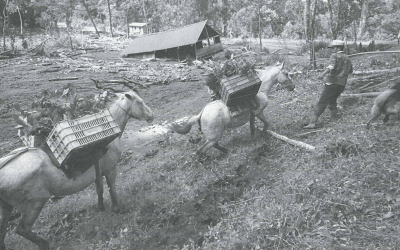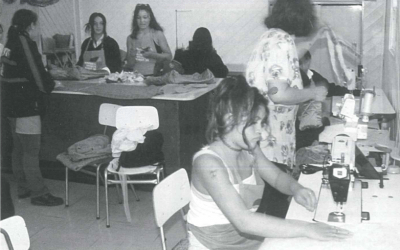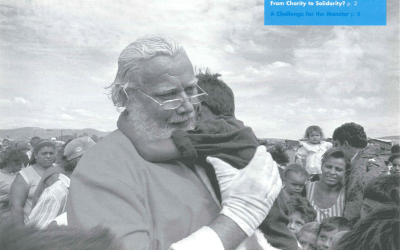New directions in Latin American
Harvard’s David Rockefeller Center for Latin American Studies (DRCLAS) and the Hauser Center for Nonprofit Organizations have combined forces to establish the Program on Philanthropy, Civil Society and Social Change in the Americas (PASCA). One of the concrete products to emerge from this new alliance is the ReVista you hold in your hands. Another is the many PASCA-sponsored seminars, visiting researchers, and workshops on these topics aimed at deepening knowledge on these subjects.
Recently, both scholars and development experts have begun to pay new attention to the role of private philanthropy, and of organized civil society, in the development of Latin America. Latin America has witnessed the emergence of increasingly active and diverse civil societies, including new interest groups, grassroots and civic organizations, and grant making and operational foundations. However, there is still a paucity of research on such organizations, on their past histories and current practices, and few materials are available for training Latin American leaders in the nonprofit sector.
PASCA, which began with a collaboration between the two centers in 1998, aims to tap Harvard’s convening power and multiple resources to promote greater understanding of Latin America’s philanthropic and voluntary traditions, and to assess the nature and impact of private philanthropy and nonprofit organizations in this region today. It also seeks to promote stronger networks of scholars and practitioners in these spheres across the Americas, to address specific social as well as institutional challenges.
Cynthia Sanborn, the William Henry Bloomberg Visiting Professor of Philanthropy and PASCA Director, and Rodrigo Villar, PASCA Program Coordinator, have developed a series of programs to promote these objectives.
For example, the lecture series, Philanthropy and Social Change in the Americas, open to all interested participants, included Nelson I. Colón, President of the Puerto Rico Community Foundation, on philanthropy and community development; and Ignacio Irarrázaval, member of the Chilean Citizen Council for Strengthening Civil Society, on that country’s recent public-private initiative to strengthen civil society, with support from the IDB. The spring lecture series focused on “Citizens, Entrepreneurs and NGOs: Private Actors and the Public Good in Brazil”, and included many of the authors found in the Brazil section of this issue.
The PASCA program has sponsored a series of international conferences open to the Harvard community and the general public, as well as smaller workshops for interested specialists. These events generally focus on an original piece of research, a new policy proposal, or a set of specific questions, and allow more in-depth discussion. For example, two workshops (in 2000 and 2001) have focused on controversial public policy issues related to nonprofit development, including freedom of association, tax incentives for nonprofits, and regulation of this sector.
PASCA also provides short-term residential fellowships for leading scholars and practitioners from Latin America, for periods averaging two to six weeks. During this time they may conduct research, prepare publications, establish contact with counterparts at Harvard and in the Boston area, and share their experiences with interested faculty, students and community members. The program also maintains ongoing contact with worldwide networks of scholars and civil society activists, promotes the development of case studies and other teaching materials, and provides support for Harvard faculty and students to research issues of philanthropy and civil society.
In late May, an invitation-only workshop for donors and practitioners is slated to examine “Philanthropy and Social Change in Latin America: Strategies and Lessons.” The objective is to discuss strategies for the promotion of philanthropy for social change, and lessons from existing philanthropic initiatives aimed at addressing the causes of poverty and inequality, not just the consequences. For example, specific sessions will examine the role of philanthropy in community development and education reform. Indeed, as the name suggests, the relationship (or lack thereof) between philanthropy and social change, is what PASCA seeks to address through its many activities.
Spring 2002, Volume I, Number 3
PASCA program activities are made possible due to the generous support of the Tinker and Lampadia Foundations.
Related Articles
Obras de Infraestructura Básica de Fácil Ejecución a través de la Autogestión
En el Ecuador rural y en las zonas citadinas marginales, la carencia de servicios básicos se ha convertido en un mal endémico no resuelto hasta …
Responsabilidad Social Empresarial: Algunos Hechos Que Cuentan
La Responsabilidad Social Corporativa (RSC) es una temática más bien nueva en Chile. Aún cuando se encuentran acciones filantrópicas desde tiempos de la colonia, la relación de la …
Algunos Casos en Chile
Un caso fue José Tomás Urmeneta, un empresario del siglo XIX quien, en un momento de auge del sector agroexportador chileno, en su testamento dejó asignados recursos para …




